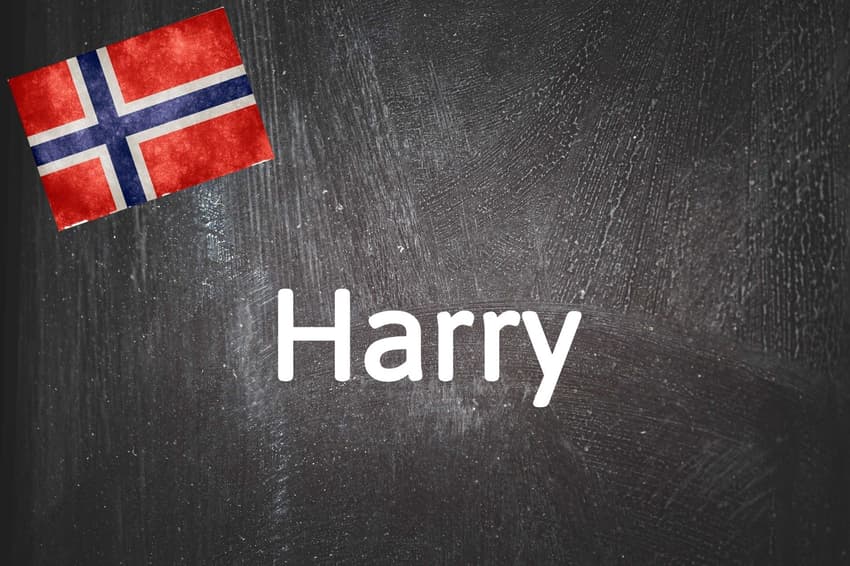Norwegian word of the day: Harry

The term, derived from the English name, has a few uses, not many of them pleasant.
What does it mean?
Harry can be a slightly tricky term to pin down, although it is primarily used in a derisory manner to various extents.
The expression can be used to describe something that is tasteless, unsophisticated or vulgar. Things that are out of fashion or in bad taste can also be described as harry, according to the Large Norwegian Encyclopedia (Store Norske Lexicon).
However, the word can be used positively, such as to describe something as understated, down to earth or popular.
Over time the word has spawned several other phrases. The most popular of these is probably harrytur, which is taking a trip to Sweden for cheaper shopping.
These days the term harrytur is used by shoppers more affectionately. Although former minister Lars Sponheim coined the original term to scorn those who go on these cross-border shopping trips.
READ MORE: What is harryhandel, and why do Norwegians love it so much?
Where does the term come from?
The term originated at the beginning of the 20th century and was used by upper-class youths to make fun of those from the working classes. This is because working-class people were more likely to have “English” first names, such as Harry, while children from more affluent backgrounds would have more traditional Scandinavian names.
In Oslo, there has been a long history of a class divide, even if the wealth gap in modern times has shrunk significantly. For example, the wealthy typically lived in the west of the city, while those from the lower classes, immigrants and factory workers lived in east Oslo.
In more modern times, harry isn’t used as much to bash those from lower classes but is used to generally describe things that are in bad taste. Although taste is subjective, meaning what is and isn’t harry is down to the individual’s sensibilities.
Use it like this:
Jonathan har kjøpt seg dongeribukser med flammer oppover buksebeina. Det er skikkelig harry!
(Jonathan has bought jeans with flames painted up the legs. It is really tacky!)
Jeg skal bare harryhandel i Sverige til helgen, vil du bli med?
(I am going border shopping in Sweden this weekend, would you like to come?)
Comments
See Also
What does it mean?
Harry can be a slightly tricky term to pin down, although it is primarily used in a derisory manner to various extents.
The expression can be used to describe something that is tasteless, unsophisticated or vulgar. Things that are out of fashion or in bad taste can also be described as harry, according to the Large Norwegian Encyclopedia (Store Norske Lexicon).
However, the word can be used positively, such as to describe something as understated, down to earth or popular.
Over time the word has spawned several other phrases. The most popular of these is probably harrytur, which is taking a trip to Sweden for cheaper shopping.
These days the term harrytur is used by shoppers more affectionately. Although former minister Lars Sponheim coined the original term to scorn those who go on these cross-border shopping trips.
READ MORE: What is harryhandel, and why do Norwegians love it so much?
Where does the term come from?
The term originated at the beginning of the 20th century and was used by upper-class youths to make fun of those from the working classes. This is because working-class people were more likely to have “English” first names, such as Harry, while children from more affluent backgrounds would have more traditional Scandinavian names.
In Oslo, there has been a long history of a class divide, even if the wealth gap in modern times has shrunk significantly. For example, the wealthy typically lived in the west of the city, while those from the lower classes, immigrants and factory workers lived in east Oslo.
In more modern times, harry isn’t used as much to bash those from lower classes but is used to generally describe things that are in bad taste. Although taste is subjective, meaning what is and isn’t harry is down to the individual’s sensibilities.
Use it like this:
Jonathan har kjøpt seg dongeribukser med flammer oppover buksebeina. Det er skikkelig harry!
(Jonathan has bought jeans with flames painted up the legs. It is really tacky!)
Jeg skal bare harryhandel i Sverige til helgen, vil du bli med?
(I am going border shopping in Sweden this weekend, would you like to come?)
Join the conversation in our comments section below. Share your own views and experience and if you have a question or suggestion for our journalists then email us at [email protected].
Please keep comments civil, constructive and on topic – and make sure to read our terms of use before getting involved.
Please log in here to leave a comment.